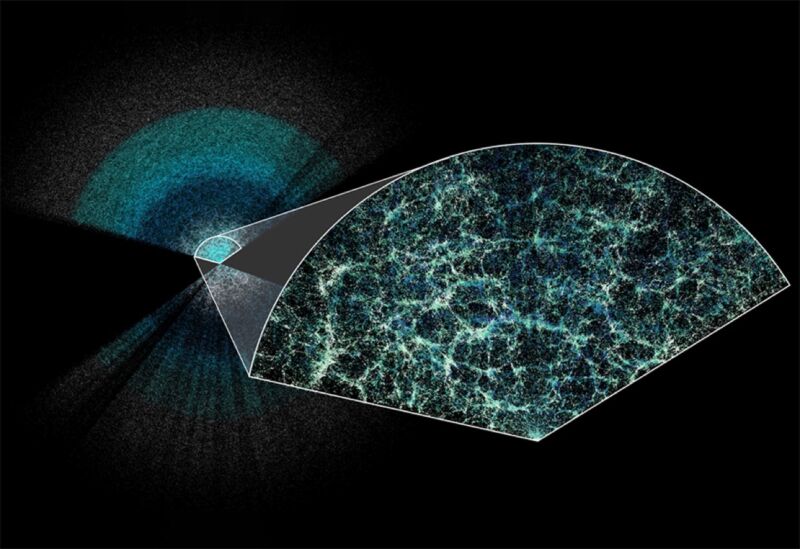
Enlarge / The Dark Energy Spectroscopic Instrument (DESI) has made the largest 3D map of our universe to date. Claire Lamman/DESI collaboration reader comments 5 An international collaboration of scientists has created the largest 3D map of our universe to date based on the first results from the Dark Energy Spectroscopic Instrument (DESI). It's an impressive achievement, with more to come, but the most significant finding stems from the collaboration's new measurements of dark energy. Those results roughly agree with the current prevailing theoretical model for dark energy, in which dark energy is constant over time. But there are some tantalizing hints that it could vary over time instead, which would call for some changes to that prevailing model. Granted, those hints are still below the necessary threshold to claim discovery and hence fall under the rubric of "huge, if true." We'll have to wait for more data from DESI's continuing measurements to see if they hold up. In the meantime, multiple papers delving into the technical details behind these first results have been posted to the arXiv, and there will be several talks presented at a meeting of the
American Physical Society being held this week in Sacramento,
California, as well as at Rencontres de Moriond in
Italy. “Our results show some interesting deviations from the standard model of the universe that could indicate that dark energy is evolving over time,” said Mustapha Ishak-Boushaki , a physicist at the University of
Texas, Dallas, and a member of the DESI collaboration. “The more data we collect, the better equipped we will be to determine whether this finding holds. With more data, we might identify different explanations for the result we observe or confirm it. If it persists, such a result will shed some light on what is causing cosmic acceleration and provide a huge step in understanding the evolution of our universe.” Advertisement Hitting the accelerator What is the universe made of? The current consensus is that ordinary matter accounts for a mere 4 percent of all matter in the universe, while dark matter accounts for another 23 percent. Dark energy accounts for the remaining 73 percent, and that dark energy is the driving force behind the universe's accelerating expansion rate. Further Reading Study: Conflicting values for Hubble Constant not due to measurement error There was a time when scientists believed that the Universe was static, but that changed with Albert Einstein's general theory of relativity. Alexander Friedmann published a set of equations in 1922 showing that the Universe might actually be expanding, with Georges Lemaitre later making an independent derivation to arrive at that same conclusion. Edwin Hubble confirmed this expansion with observational data in 1929. Prior to this, Einstein had been trying to modify general relativity by adding a cosmological constant to get a static universe from his theory; after Hubble's discovery, legend has it , he referred to that effort as his biggest blunder. Scientists expected that if the universe were still expanding, the attractive force of gravity would eventually slow down the rate of expansion. But in 1998, two separate teams of physicists measured the change in the universe’s expansion rate, using distant supernovae as mileposts. When Hubble made his 1929 measurements, the farthest red-shifted galaxies were roughly 6 million light-years away. If expansion was now slowing under the influence of gravity, supernovae in those distant galaxies should appear brighter and closer than their red shifts would suggest. Instead, just the opposite was true. At high red shifts, the most distant supernovae are dimmer than they would be if the universe were slowing down. Instead of gradually slowing down, the expansion of the universe is speeding up. The leaders of those two teams went on to win the 2011 Nobel Prize in Physics . Those 1998 results have since been corroborated by improved supernovae measurements, as well as indirect measurements of the cosmic microwave background (CMB), gravitational lensing, and the large-scale structure of the cosmos. Advertisement If dark matter gives rise to the gravity that holds the universe together, then dark energy is the counter-force pushing the universe apart. Very early in the universe’s existence, dark matter dominated. Everything was closer together, so its density was higher than that of the dark energy, and its gravitational pull was stronger so the early galaxies could form. But as the universe continued to expand, the dark matter density, and hence the gravitational pull, decreased until it was less than that of the dark energy. So instead of the expected slowdown in the expansion rate, the now-dominant dark energy began pushing the universe apart at ever-faster rates. Take an interactive flight through millions of galaxies mapped using coordinate data from DESI. Credit: Fiske Planetarium/CU Boulder/DES Collaboration. Einstein’s cosmological constant (lambda) implied the existence of a repulsive form of gravity. Quantum physics holds that even the emptiest vacuum is teeming with energy in the form of “virtual” particles that wink in and out of existence, flying apart and coming together in an intricate quantum dance. This roiling sea of virtual particles could give rise to dark energy, giving the universe a little extra push so that it can continue accelerating. The problem is that the quantum vacuum contains too much energy: roughly 10 120 times too much. So the universe should be accelerating much faster than it is if the dark energy is, essentially, the cosmological constant. Still, all the observations to date indicate that it's constant. The best theoretical fit is known as the Lambda CDM model , which incorporates both a weakly interacting cold dark matter and dark energy. One alternative theory proposes that the universe may be filled with a fluctuating form of dark energy dubbed “ quintessence .” There are also several other alternative models that assume the density of dark energy has varied over the history of the universe. Here's where the potentially exciting initial findings of DESI enter the chat.